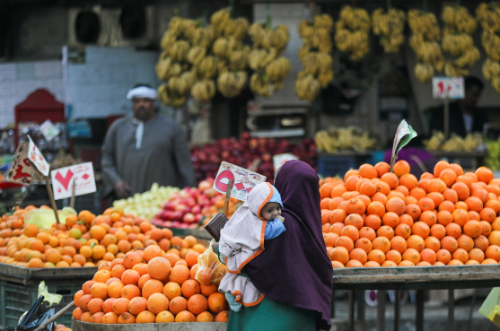Egypt’s Annual Inflation Rises to 16.5% in May on Food, Utilities

TLDR
- Egypt’s annual headline inflation rate reached 16.5% in May, up from 13.5% in April
- The increase was mainly driven by an 11.2% year-on-year rise in food and beverage prices
- Egypt continues to face inflationary pressure despite recent monetary policy measures, including interest rate hikes
Egypt’s annual headline inflation rate reached 16.5% in May, up from 13.5% in April, according to data released by the Central Agency for Public Mobilization and Statistics (CAPMAS) on June 4.
The increase was mainly driven by an 11.2% year-on-year rise in food and beverage prices. Within this category, grains and bread surged 16%, while fish and seafood rose 10.3%. Prices of alcoholic beverages and tobacco also climbed 15.6% compared to May 2024.
The housing, water, electricity, gas, and fuel category saw a 19.3% year-on-year increase, reflecting the impact of rising utility and energy costs on households. On a monthly basis, inflation rose 1.8% in May, with the consumer price index (CPI) reaching 258.4 points.
Daba is Africa's leading investment platform for private and public markets. Download here
Key Takeaways
Egypt continues to face inflationary pressure despite recent monetary policy measures, including interest rate hikes by the Central Bank aimed at curbing price growth and stabilizing the Egyptian pound. The latest inflation figures highlight persistent cost-of-living challenges, particularly in essential categories like food and housing. Egypt’s reliance on food imports leaves it exposed to global commodity price shifts and currency fluctuations, especially amid geopolitical tensions and logistical disruptions in the Red Sea. The government has taken steps to mitigate inflation through increased subsidies, import controls, and foreign exchange interventions. However, with the IMF agreement requiring fiscal reforms and currency flexibility, inflationary risks may persist. The rise in utility prices also reflects adjustments in state-controlled energy tariffs, part of a broader effort to reduce budget deficits. These measures, while fiscally necessary, continue to add pressure on household budgets. Economists expect inflation to remain elevated in the short term before gradually easing toward the end of the year, depending on exchange rate movements, global commodity trends, and domestic supply chain resilience.

Next Frontier
Stay up to date on major news and events in African markets. Delivered weekly.
Pulse54
UDeep-dives into what’s old and new in Africa’s investment landscape. Delivered twice monthly.
Events
Sign up to stay informed about our regular webinars, product launches, and exhibitions.




